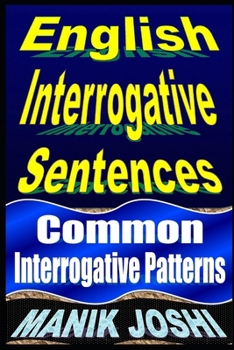English Interrogative Sentences: Common Interrogative Patterns
This book covers the following topics: Interrogative Sentences -- Structures -- (1) Wh-Question Word + Be/Do/Have/Modal; (2) Wh-Question Word + Word/Words + Be/Do/Have/Modal; (3) Wh-Question Word + Main Verb (Present or Past); (4) Interrogatives Sentences - Be/Do/Have/Modal; (5) Question Tags; (6) What if; (7) How Long/How Much/How Many; (8) Wh-Question Word + To + Verb Word; (9) "What About" and "How About"; (10) Alternative Questions; (11) Indirect Questions --- Formation of Interrogatives from Affirmatives -- Exercises --- Sample This: Interrogative sentences are used to ask questions. An interrogative sentence ends with a question mark. Most common interrogative words are as follows: What, When, Where, Which, Who, Whom, Whose, Why, How --- Interrogative words and what they refer to: What - refers to 'specific information' or confirmation/repetition; When - refers to 'at what time' or 'on what occasion'; Where - refers to 'in what place, position or situation'; Which - refers 'choice or alternative'; Who - refers 'identity' of a subject (person/people); Whom - refers to 'identity' of an object (person/people); Whose - refers to 'who something belongs to'; Why - refers to 'reason, explanation or purpose'; How - refers to 'way or manner', 'condition or quality' --- These words are called 'Wh-question words' because all these words contain letter 'w' and 'h'. All these words (except 'how') even start from 'Wh'. --- NOTE: The following words are also used to ask questions: Whatever, Whenever, Wherever, Whoever. These forms show 'surprise, confusion, or emphasis. --- Besides 'Wh-question words', Auxiliary Verbs 'Be', 'Do', 'Have', and 'Modal Verbs' are also used to form interrogative sentences. Following is the list of auxiliary and modal verbs: Auxiliary Verb-- Be-- Am, Is, Are, Was, Were; Auxiliary Verb-- Do-- Do, Does, Did; Auxiliary Verb-- Have-- Have, Has, Had; Modal Verbs-- May, Might, Can, Could, Will, Would, Shall, Should, Must, Need, Used (To), Ought (To), Dare. You can begin sentences with these verbs to form Yes/No interrogative sentences. --- (1A). What + Be/Do/Have/Modal -- What is a good pet to give a five-year-old child? What is a long way away? What is a reasonable grocery budget? What is age got to do with it? What is all that? What is Australia's national food? What is behind the nation's food shortages? What is better for your company: happy staff or short-term profits? What is Brazil to you? What is going on in India? What is going to take place over the next 90 minutes? What is in the haze we are breathing? What is it about the first day of the year that gets us so excited? What is it and does it work? What is it like to be sectioned? What is it like to fly an Airbus A380? What is it like to have won an unlimited supply of something? What is it like to live in a hut? What is it that makes Compaq so trusted? What is it to be politico-ethical? What is Japan ready to do? What is leading to rising incidents of building collapses in the region? What is most important in your life? What is most likely to please you? What is okay to eat and how much is too much? What is the President up to after breaking away from the alliance? What is the rate of exchange against the pound? What is right for our students?
Format:Paperback
Language:English
ISBN:1492741833
ISBN13:9781492741831
Release Date:September 2013
Publisher:Createspace Independent Publishing Platform
Length:102 Pages
Weight:0.32 lbs.
Dimensions:0.2" x 6.0" x 9.0"
Customer Reviews
0 rating





